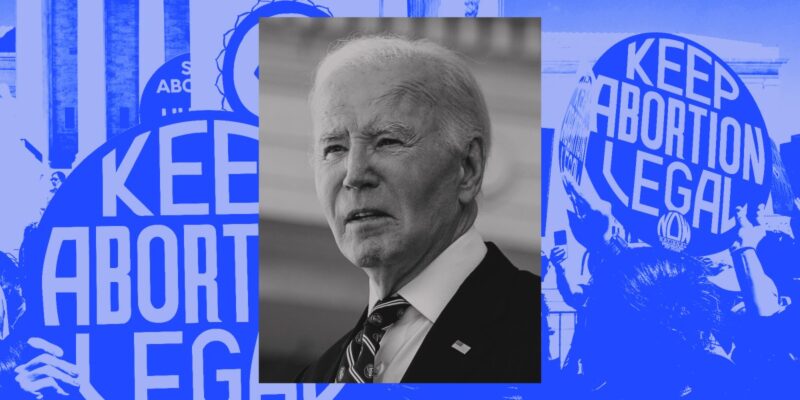
Trump’s reelection has been described by advocates and experts as a final blow to reproductive rights.
These fears are not unfounded. Trump appointed three of the five conservative Supreme Court justices who overruled Roe v. Wade, ending the constitutional right to abortion and unleashing a health care apocalypse. Vulnerable women found themselves in even greater danger thanks to abortion bans in more than a dozen states that have enabled abusers and left doctors fearful of prosecution if they intervene in pregnancy-related emergencies that require abortion care. ProPublica reported such bans appeared to have led to the deaths of several women in Georgia and Texas who were unable to get necessary abortion care when faced with dire medical complications. Add to this, Project 2025—the 900-plus-page extremist guidebook to a second Trump term—recommends that various federal agencies take sweeping actions to roll back abortion access.
Trump’s convictions on abortion have been flexible throughout his career. During the presidential campaign, he tried to distance himself from Project 2025 and claimed he would leave abortion policy “to the states.” Immediately after the election, however, his acolytes admitted that “Project 2025 is the agenda.”
Given all this, reproductive rights experts and advocates agree that the future of abortion access is bleak. But there are several actions President Biden and his administration could take before Inauguration Day that could make it harder for the next administration to enact their absolutist anti-abortion agenda. “Some of [the ideas] are just throwing monkey wrenches into the gears,” says David Cohen, a law professor at Drexel University whose scholarly work focuses on abortion access, “and maybe with the chaotic Trump administration that helps delay some of the harm.”
“Some of [the ideas] are just throwing monkey wrenches into the gears, and maybe with the chaotic Trump administration, that helps delay some of the harm.”
While Vice President Kamala Harris campaigned on “restoring reproductive freedom,” it’s unclear if the Biden administration will prioritize these requests before the transition. The White House did not respond on the record to the specific proposals mentioned in this story, but pointed to the administration’s record of defending and expanding reproductive rights. But some say there’s more they can, and should, do. “If the administration was hesitant or holding off, now is the time, I think, to not hesitate,” Rachel Rebouché, reproductive rights legal scholar and dean of Temple Law School, says.
Here’s a look at some of what the administration could do to stymie the Trump administration’s anti-abortion agenda before he’s back in the White House.
Preemptively Pardon Providers of Abortion Pills
The Comstock Act is a 19th-century anti-obscenity law still on the books that anti-abortion Republicans argue should be used to “enforce federal law against providers and distributors of [abortion] pills.” In December 2022, Biden’s DOJ issued a memo arguing that the law cannot be used to prosecute abortion pill providers. Earlier this year, Democrats in Congress introduced legislation to repeal parts of the bill lawmakers say could be most relevant to abortion, but the measure has languished in House and the Senate committees.
Given that Project 2025 advises Trump’s DOJ to invoke the Comstock Act to prosecute providers of abortion pills, some advocates suggest that Biden preemptively pardon anyone who could be implicated for doing so. Cohen, from Drexel, notes that a preemptive pardon “would make it so that the people who have been mailing [abortion] pills, or mailing procedural instruments or supplies, are not at risk of being prosecuted.”
Jodi Jacobson, founder and executive director of the initiative Healthcare Across Borders, described the proposal as “a proactive thing that the Biden administration can do to automatically protect people over the five-year statute of limitations” for federal offenses. Jacobson oversees a coalition that comprises several reproductive health advocacy organizations that plan to ask the Biden administration to issue the blanket preemptive pardon. “This is a no-brainer—there is no reason not to do this,” she says, adding that it would “take off the table the immediate criminalization of folks who have been trying to save lives.”
Trump’s Food and Drug Administration, though, could still revoke its approval of abortion pills, as Project 2025 recommends—but the preemptive pardon would protect providers who could otherwise face prosecution. Experts concede that while there would likely be legal challenges, “pardon power is pretty plenary to the president,” Cohen says. President Gerald Ford preemptively pardoned his predecessor, President Richard Nixon, for instance, which allowed Nixon to avoid Watergate-related charges (but ignited a national outcry). The Department of Justice did not respond to questions about the proposal from Mother Jones.
Push to Fill Vacancies in the Federal Judiciary
Biden cannot shift the balance of the Supreme Court’s conservative supermajority before he leaves office, but the president and Senate Democrats do have the power to attempt to fill the 47 vacancies for open seats in the federal judiciary, mostly in federal district courts.
“We know the federal courts will continue to be central in the fight for reproductive freedom; the administration and Congress must be vigilant now in safeguarding our rights as much as possible,” Karen Stone, vice president of public policy and government relations at Planned Parenthood Action Fund, said in a statement provided to Mother Jones.
“We know the federal courts will continue to be central in the fight for reproductive freedom; the administration and Congress must be vigilant now in safeguarding our rights as much as possible.”
The significance of these lifetime appointments for the future of reproductive rights becomes apparent when you consider Matthew Kacsmaryk. He’s a Trump-appointed federal judge in Texas who issued an anti-science ruling last year that paved the way for anti-abortion activists to bring a case to the Supreme Court challenging the FDA’s approval of mifepristone, one of the two drugs used in a medication abortion. (The justices ultimately struck down the case, ruling that the anti-abortion plaintiffs lacked standing to bring the suit, as my colleague Nina Martin reported.)
Earlier this year, the Supreme Court sent the case on emergency abortion care back to the 9th Circuit Court of Appeals—a federal court in California with 10 Trump-appointed judges and jurisdiction over more than a dozen district courts in nine states. “The power of lower court federal judges is immense,” Cohen says, “because the Supreme Court only deals with such a limited number of cases.”
Once Biden makes a nomination, the Senate Judiciary Committee, currently chaired by Sen. Dick Durbin (D-Ill.), recommends whether to send nominees to a full floor vote, which is required for their confirmation. A spokesperson for Durbin’s office said that, as of Wednesday morning, there were 16 nominees ready for a floor vote, and eight more who have had committee hearings and are waiting for a committee vote. The spokesperson added that Durbin “aims to confirm every possible nominee before the end of this Congress.” Senate Majority Leader Chuck Schumer (D-N.Y.) said in a statement, “We are going to get as many done as we can.”
But that won’t necessarily be easy. Trump said in a social media post this weekend that “no Judges should be approved during this period of time because the Democrats are looking to ram through their Judges as the Republicans fight over Leadership.” Indeed, for Senate Democrats, time is of the essence. The next session of Congress begins January 3, just over two weeks before Trump takes office—so Biden’s nominees would need to be approved by after the New Year to make it onto the bench. Sen. Joe Manchin (I-W.Va.), whose vote is crucial in the tight Senate, may once again undermine Democrats’ plans. He told Politico in March he would not support any Biden-nominated judge unless they have at least one Republican supporter.
Still, several advocates say they hope Senate Democrats make the necessary effort to get as many Biden-nominated judges approved as possible, considering the influence they’ll likely have on the future of reproductive rights. “If [getting judges approved] means working over Thanksgiving, working over Christmas, working over New Year’s—do it,” Cohen says. “This is not something that should be gifted to Trump.” One way they could speed circumvent Republican opposition is by dispensing with a tradition known as “blue slips,” in which senators weigh in on whether or not they support the federal court nominees for their state. There is precedent for this: Sen. Chuck Grassley (R-Iowa), former chair of the Senate Judiciary Committee, abandoned the tradition—to the ire of Democrats—to get two Trump-nominated judges confirmed despite opposition from their home states’ Democratic senators. With only two months until the next Congress, Senate Democrats may not want to buck this tradition, though; they may want to keep “blue slips” as a weapon in their own arsenal as they anticipate Trump’s nominees to the federal judiciary.
Finalize Pending Reproductive Health-Related Rules for Federal Agencies
The Biden administration made headlines last month when it announced a proposed rule to allow 52 million women with private health insurance to obtain over-the-counter contraception for free under the Affordable Care Act. (Trump, on the other hand, has said he wants to “replace” Obamacare. And while he claims he would not restrict contraception access, it will face myriad threats in his administration, as my colleague Madison Pauly recently reported.)
But the contraception rule has yet to be finalized, and its pathway to becoming a reality is less straightforward than the optimistic White House press release suggests. After the public comment period—which has, so far, only attracted 2 people—ends on December 27, officials will analyze the comments and then write the final rule, which could then not even take effect for another 30 days.
Unlike executive orders, which can be wiped out with the stroke of a pen, rules approved for federal agencies are typically harder to undo. That’s thanks to the Administrative Procedure Act, which outlines the process of how a proposed rule becomes a finalized regulation, and requires that federal agencies do not act in a way that is “arbitrary, capricious, [or] an abuse of discretion.” Rebouché, from Temple Law School, says the administration needs to aim to get the contraception rule—and any other similar ones—finalized as soon as possible. “Any rule that’s already in process, push forward,” she says.
Katie O’Connor, senior director of federal abortion policy at the National Women’s Law Center, would like to see the Consumer Financial Protection Bureau’s promise to launch a rule focused on ensuring “modern-day digital data brokers are not misusing or abusing our sensitive data” come to pass. An investigation by the office of Sen. Ron Wyden (D-Ore.) earlier this year found that a data broker tracked visits by individuals to 600 Planned Parenthood locations across the country and then sold the data for an anti-abortion ad campaign. Even though the rule was promised last year, a CFPB spokesperson says they did not have any update.
Even if the agency tried to ram it through, though, any rules that get finalized at this late stage of the administration are at risk of being overturned in the next session of the GOP-controlled Congress, thanks to the Congressional Review Act, notes Steven Balla, associate professor of political science at George Washington University and co-director of the school’s Regulatory Studies Center. During Trump’s first term, Congress used the legislation to overturn 16 rules issued at the end of the preceding Obama administration—the most of any administration, ever, Balla explains.
Complete Investigations Into Hospitals Accused of Violating Federal Law on Emergency Abortion Care
Earlier this year, the Supreme Court heard a case on whether hospitals must provide abortions to people whose lives or health are at risk, even in states with abortion bans, under the federal Emergency Medical Treatment and Labor Act, known as EMTALA. In a 6–3 decision—with Thomas, Alito, and Gorsuch dissenting—the court sent the case back to a lower court, refusing to rule on the merits of the Biden administration’s argument that EMTALA requires hospitals to provide emergency abortion care in states with post-Dobbs abortion bans that lack exceptions for a patient’s health. Project 2025 proposes an alternative approach: The guidebook says that “EMTALA requires no abortions” and that HHS should stop investigating hospitals that have failed to comply with its interpretation of the law.
Abortion rights advocates say Biden’s HHS should complete as many investigations as possible into hospitals that may have violated their interpretation of EMTALA by not providing stabilizing abortion care when needed. Otherwise, the Trump administration would inherit them, a spokesperson for the Center for Reproductive Rights points out.
That spokesperson added that the organization has also submitted three recent complaints to HHS, focused on hospitals in Texas and Arizona that allegedly violated EMTALA by failing to provide medically necessary abortions to women in need. A spokesperson for the Centers for Medicare and Medicaid Services at HHS said the agency does not comment on ongoing investigations.
But even if these investigations were undertaken and completed before the transition, reports suggest they would be unlikely to face penalties from the Biden administration. Investigations recently published by the Associated Press found that more than 100 pregnant women were turned away from emergency rooms while they were in medical distress over the past two years, and that none of those hospitals were fined. Last year, HHS announced it was investigating two unnamed hospitals for allegedly violating the law by failing to offer a woman with a nonviable pregnancy the abortion care she needed. The National Women’s Law Center said it filed the complaint on behalf of Mylissa Farmer and identified the hospitals as Freeman Hospital West in Joplin, Missouri, and the University of Kansas Health System in Kansas City, Kansas. A spokesperson for the Centers for Medicare and Medicaid Services told Mother Jones Wednesday, “Both hospitals are back in compliance,” but did not clarify whether they had faced monetary penalties.
One thing that both advocates and officials agree on? Elections have consequences, and there’s a limit to what Biden administration can actually do to mitigate the decades-long damage the Trump administration could do to reproductive rights once he takes office. “The electorate was confused or didn’t really care about abortion,” Cohen says, “and we’re reaping the reality of it.”















